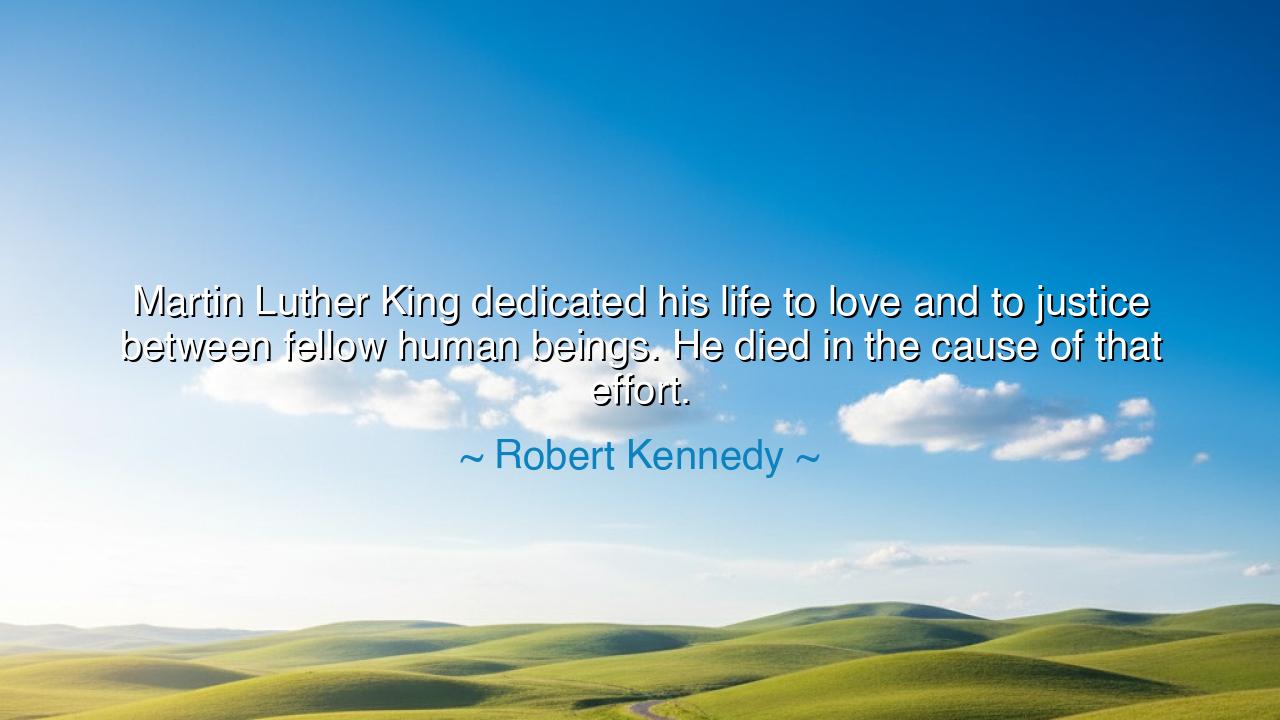
Martin Luther King dedicated his life to love and to justice
Martin Luther King dedicated his life to love and to justice between fellow human beings. He died in the cause of that effort.






"Martin Luther King dedicated his life to love and to justice between fellow human beings. He died in the cause of that effort." Thus spoke Robert F. Kennedy, himself a man of courage and sorrow, on the night the world was struck by the loss of a prophet. In these solemn words, uttered beneath the dark sky of 1968, Kennedy did not merely mourn a man—he consecrated a legacy. He saw in Martin Luther King Jr. not only a leader of men but a bearer of the eternal flame of love and justice, a flame that has burned through centuries of oppression, through kingdoms and empires, through blood and tears. When Kennedy said these words, he spoke with the tone of the ancients, for he knew that such men as King do not truly die—they become part of the moral foundation of humanity.
Dr. King’s life was a living scripture of love in action. He stood before the mighty machinery of hatred, armed not with weapons but with faith and the power of conscience. In an age when violence sought to silence reason, and fear ruled over compassion, he dared to proclaim that love was stronger than hate, and that justice was not the privilege of the few but the birthright of all. Kennedy’s tribute captures the essence of that calling: to love one’s enemies, to march for equality, to believe in peace when peace seemed impossible. King’s every word, every prayer, every step was a defiance of darkness—a living testament that the human spirit, when guided by love, is unconquerable.
In Kennedy’s voice that night, there was both reverence and warning. For he knew that love and justice are not soft virtues, but the hardest path a man can walk. They demand sacrifice, patience, forgiveness, and courage beyond measure. Dr. King’s death was not an accident of history—it was the inevitable cost of carrying divine truth into a world still blind with prejudice. Like the prophets of old, he walked willingly toward danger, knowing that his message might be the very thing that took his life. Yet, he walked on. For he believed, as Kennedy did, that to die for love is to live forever in the hearts of men.
Consider the night of King’s last speech in Memphis. Storm clouds gathered, and he spoke as one who already knew his time was short. “I may not get there with you,” he said, “but we, as a people, will get to the Promised Land.” Those words were not despair, but destiny. They echoed through the ages, the voice of a man who saw beyond his own days into the dawn of freedom. Kennedy’s words, spoken after that fateful night, sealed the truth of it: King died in the cause of that effort, not as a victim, but as a martyr for humanity’s highest law—the law of love that binds each soul to its neighbor.
And when Kennedy himself fell to violence only two months later, their lives became entwined forever—a testament to the peril and the glory of standing for truth. Both men were bound by the same sacred duty: to build bridges where others built walls, to heal wounds instead of widening them, to believe that love can redeem even the darkest heart. In their deaths, the torch of justice passed to every man and woman who still believes that compassion is stronger than cruelty, and that peace can rise even from the ashes of violence.
But let us not remember these words as mere elegy; let them be instruction. To dedicate one’s life to love and justice is to live with eyes open and heart unguarded. It means to forgive when wronged, to listen when misunderstood, to speak truth even when silence would be safer. The world will test you, as it tested King and Kennedy, but the soul that holds fast to love stands taller than any empire of hate. The ancients taught that justice is the root of order and love the breath of life—without them, civilization decays into chaos.
So, my listener, take this teaching into your heart: Live as one dedicated to love and justice. Let not bitterness rule your thoughts, nor anger poison your deeds. When hatred shouts, let your voice be gentler yet stronger. When despair looms, lift your eyes to the example of those who gave their lives so that we might live free of fear. For in every age, love must rise anew; and in every heart, justice must be reborn.
In the end, both Kennedy’s words and King’s life teach the same eternal truth: the measure of a soul is not what it gains, but what it gives. To love in a loveless time is the greatest rebellion; to act justly in an unjust world is the highest form of faith. Let us, then, not merely remember these men, but continue their work—so that their deaths, like their words, shall not fade, but burn forever as beacons guiding humanity toward the promised land of peace.






AAdministratorAdministrator
Welcome, honored guests. Please leave a comment, we will respond soon